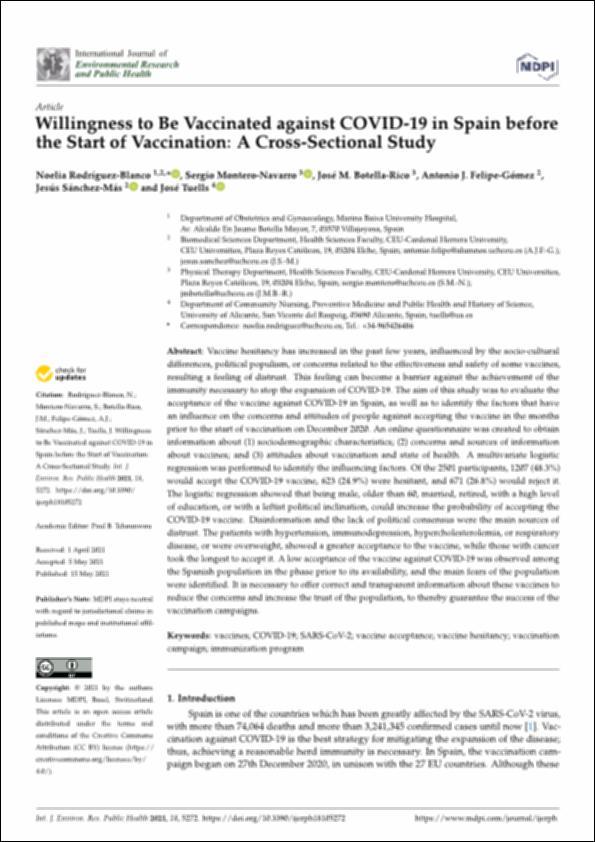Por favor, use este identificador para citar o enlazar este ítem:
http://hdl.handle.net/10637/12896Willingness to be vaccinated against COVID-19 in Spain before the start of vaccination : a cross-sectional study
| Título : | Willingness to be vaccinated against COVID-19 in Spain before the start of vaccination : a cross-sectional study |
| Autor : | Rodríguez Blanco, Noelia Montero Navarro, Sergio Botella Rico, José Martín Felipe Gómez, Antonio J. Sánchez Mas, Jesús Manuel Tuells Hernández, José Vicente |
| Materias: | Vacunas.; Vaccines.; SARS-CoV-2 (Virus) - Vaccination - Spain.; COVID-19 (Disease) - Vaccination - Spain.; SARS-CoV-2 (Virus) - Vacunación - España.; COVID-19 - Vacunación - España. |
| Editorial : | MDPI |
| Citación : | Rodríguez-Blanco, N., Montero-Navarro, S., Botella-Rico, J.M., Felipe-Gómez, A.J., Sánchez-Más, J. & Tuells, J. (2021). Willingness to be vaccinated against COVID-19 in Spain before the start of vaccination: a cross-sectional study. International Journal of Environmental Research and Public Health, vol. 18, i. 10 (15 may.), art. 5272. DOI: https://doi.org/10.3390/ijerph18105272 |
| Resumen : | Vaccine hesitancy has increased in the past few years, influenced by the socio-cultural differences, political populism, or concerns related to the effectiveness and safety of some vaccines, resulting a feeling of distrust. This feeling can become a barrier against the achievement of the immunity necessary to stop the expansion of COVID-19. The aim of this study was to evaluate the acceptance of the vaccine against COVID-19 in Spain, as well as to identify the factors that have an influence on the concerns and attitudes of people against accepting the vaccine in the months prior to the start of vaccination on December 2020. An online questionnaire was created to obtain information about (1) sociodemographic characteristics; (2) concerns and sources of information about vaccines; and (3) attitudes about vaccination and state of health. A multivariate logistic regression was performed to identify the influencing factors. Of the 2501 participants, 1207 (48.3%) would accept the COVID-19 vaccine, 623 (24.9%) were hesitant, and 671 (26.8%) would reject it. The logistic regression showed that being male, older than 60, married, retired, with a high level of education, or with a leftist political inclination, could increase the probability of accepting the COVID-19 vaccine. Disinformation and the lack of political consensus were the main sources of distrust. The patients with hypertension, immunodepression, hypercholesterolemia, or respiratory disease, or were overweight, showed a greater acceptance to the vaccine, while those with cancer took the longest to accept it. A low acceptance of the vaccine against COVID-19 was observed among the Spanish population in the phase prior to its availability, and the main fears of the population were identified. It is necessary to offer correct and transparent information about these vaccines to reduce the concerns and increase the trust of the population, to thereby guarantee the success of the vaccination campaigns. |
| Descripción : | Este artículo se encuentra disponible en la siguiente URL: https://www.mdpi.com/1660-4601/18/10/5272 Este artículo pertenece al número especial "Vaccination research for public health". |
| URI : | http://hdl.handle.net/10637/12896 |
| Derechos: | http://creativecommons.org/licenses/by/4.0/deed.es |
| ISSN : | 1660-4601 (Electrónico). |
| Fecha de publicación : | 15-may-2021 |
| Centro : | Universidad Cardenal Herrera-CEU |
| Aparece en las colecciones: | Dpto. Enfermería y Fisioterapia |
Los ítems de DSpace están protegidos por copyright, con todos los derechos reservados, a menos que se indique lo contrario.


